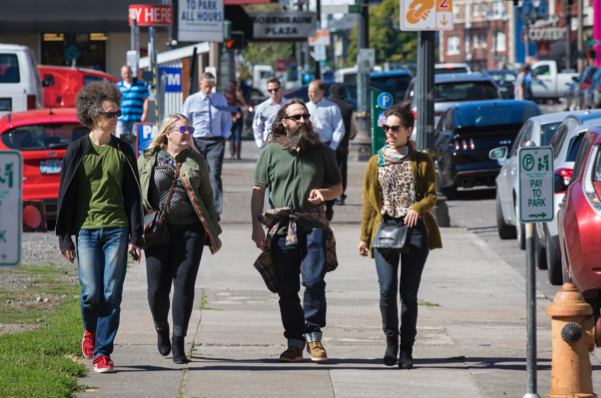Video
Advocating for the Accused
In a country where Christianity is a minority religion, a simple act of advocacy by a Christian lawyer changed the trajectory of one man’s life.
January 2018
Josh Chen (right) and Steven Arita chat above the Willamette River across from downtown Portland, Oregon.
How do millennials think about faith?
What moves them toward Christ?
How do we more effectively reach this younger generation with the gospel?
With these questions in mind, Cru® Storylines talked with Josh Chen—a Cru staff member, a millennial and one who works with and studies millennials. Born in 1980, he considers himself a hybrid between two generations.

Josh grew up in Portland, Oregon, and enjoys riding a scooter to appointments. Scooters work year round in this city, if riders wear parkas in winter.
CS: Who is considered a millennial?
Josh: People who are born between 1980 to 1998.
CS: What motivated you to study your generation?
Josh: Five years ago, my wife, Wendy, and I moved to Portland, Oregon, to work for the City ministry of Cru. I realized that students graduating into the workplace were not sharing their faith. So my motivation was: Can we figure out some more effective ways to help these young people explain the gospel?

Josh and his wife, Wendy, share a laugh during a Cru® City ministry staff meeting.
CS: What’s distinct about the way millennials view the world?
Josh: They’re a generation that’s been marketed to their entire lives. So they view everything as a brand, which means they can be highly skeptical, and for good reason.
They have a high sense of a call to social justice, so they’re natural activists. They don’t like division over political and spiritual issues. So that can create challenges when they’re trying to share their faith.
They have much higher levels of anxiety. While many factors contribute to this anxiety, I’ve noticed that a millennial’s anxiety often comes from having too many options. This anxiety can push them into this fight or flight state that keeps them from focusing on the future. So a millennial will focus on the present.

Portland averages 164 rainy days a year, the third highest among U.S. cities. However, on clear days, Mount Hood can be seen from 50 miles away.
1/6

Voodoo Doughnuts exemplifies Portland’s quirky style. The shop’s best-known treat is called the Voodoo Doll©, a doll-shaped, jelly-filled donut.
2/6

A sculpture appears to freeze mid-crawl in front of the Pacific Northwest College of Art. The school offers 10 fine art programs, including animated arts, painting and writing.
3/6

Portland’s parks are a source of civic pride as giant evergreens cover more than 10,000 acres.
4/6

Offering an ideal climate for their growth, Portland is nicknamed “the city of roses.”
5/6

The Arlene Schnitzer Concert Hall, also known as “the Schnitz,” is the home of the Oregon Symphony, the oldest orchestra in the Western United States.
6/6
CS: Older generations often consider millennials to be “entitled.” How would you respond to this?
Josh: I think all people are entitled. This goes to the root of our fallen condition. The fruit or the symptoms of that entitlement play out differently for every generation.
Though much debate surrounds the precise birth years of each American generation, we’ve compiled some basic information to help distinguish between them.
Though much debate surrounds the precise birth years of each American generation, we’ve compiled some basic information to help distinguish between them.
Traditionalists or Silent Generation: Born 1945 and before. These were children of the Great Depression and were understood as “silent” because of their conformist nature and civic-mindedness.
Baby Boomers: Born 1946 to 1964. Babies “boomed” into the world after World War II. They made some noise as they came of age during the Vietnam War and Civil Rights Era.
Generation X: Born 1965 to 1979. Generation X are known to be entrepreneurial and savvy. They got their name from author Douglas Coupland in his book Generation X: Tales for an Accelerated Culture.
Millennials (or Gen Y): Born 1980 to 1998. Millennials came of age in the new millennium. They experienced the rise of the internet and are distinguished from Gen Z by their experience of the September 11, 2001 attack.
Gen Z (or iGen): Born 1998 and later. Sometimes referred to as Gen Z because they come after Y, or iGen because of their dependence on technology.
Baby boomers can be workaholics, finding their identity in their work and in the accumulation of material wealth.
For fulfillment, millennials do what they want to do in the moment.
Both are ways to fulfill the deeper longings in their hearts, but the now versus later mentality of the millennial can feel more entitled to the baby boom generation. For one generation to look at another generation and say, “Oh, they’re way more entitled than we were,” is pretty hypocritical.

Locals revel in the saying, “Keep Portland weird.” This mix of hair styles, facial hair, eyeglasses and layered clothing plays to that theme.
CS: Let’s talk about faith. How is the way we’ve traditionally presented the gospel connecting with millennials?
Josh: I think how we understand and present the gospel is based on a Western, modern perspective, with a heavy emphasis on truth, logic and reason.
When I began studying millennials, I tried my best to remove that perspective and ask the question, “What does Jesus say is the gospel?” I spent two years in the Book of Matthew studying that idea.
What I learned, to use a marketing analogy, is that our gospel explanation was engineered to answer the questions of our parents, of the baby boom generation. This isn’t a bad thing, but we’re still using it. Jesus always contextualized the gospel for people.
“We need to contextualize the gospel for each generation, similar to what we do for different cultures.”
CS: So, what piece of the gospel are millennials drawn to?
Josh: We talk about the kingdom of God as being “now, but not yet.” Jesus both defeated death and He’s coming back to fully unite heaven and earth. We’ve tended to focus on His coming back. But I think millennials are drawn to the “now” aspects.
For example, the word “saved” in the Gospels is the Greek word sozo.
When Jesus says, “Your faith has made you well,” the word for “being made well” is the Greek word sozo. The word can also mean “to be made whole.” So it speaks to right now very clearly.
And the Greek word for “eternal life” is in the present tense as well, denoting a present reality.
Millennials are drawn to these now aspects because of the anxiety they feel in the moment and because they long to see the world made whole.
So without watering down the gospel, we can also talk about salvation as being now, and that Jesus is healing us and remaking us into our true selves in Christ. This resonates with millennials.

Josh and Herinirina Uriel, a millennial who grew up in Africa and the UK before landing in Portland, meet. City officials project a 42% population growth in the next 20 years.
CS: What are some terms that millennials are “allergic” to?
Josh: During my study of Matthew, I wanted to test language with millennials.
I tried words like faith, repentance, salvation, sin, prayer. And just about the only one that was somewhat understood was prayer. And even then they asked, “Prayer to whom?”
As I studied these words in Scripture, I began to understand them differently than what I grew up with.
Take “sin,” for example. Jesus talks about sin as something deeper than outward behavior.
We usually deal with the fruit or the symptom of sin and just modify behavior, rather than get to the root of sin.
With millennials, there is an allergic reaction to this behavior modification. So I began to use language that would get to the root of the word.
CS: Can you give an example of getting to the heart of sin?
Josh: I talk about sin as “finding life where there is no life.” This isn’t a full explanation of sin; it’s just contextualized to this target audience.
For example, I tried to find life in tennis growing up. An outward behavior with tennis players is throwing a racquet after losing a point. I got intensely angry when I lost.
Throwing a racquet, or in my case just fuming, that’s the outward behavior. But the deeper sin was that I sought life in how I performed rather than in Christ.
CS: So, when talking to a millennial about faith, what are some common pitfalls to avoid?
Josh: It’s difficult to generalize for millennials across the United States. But in a post-Christian place like Portland, a common pitfall is using traditional apologetics.
Even the question, “If you were to die today, how sure are you that you would go to heaven?” is a baby-boomer way of thinking. It implies that salvation is one specific event, like going to heaven.
That’s part of salvation. Much of the Scripture also talks about the restoration of the world.
Evangelism questions like these lean heavily on thinking that millennials don’t resonate with. They’re not thinking, “How do I get to heaven; how do I escape hell?” That was a question that people who grew up in the context of a church culture understood. But many millennials did not grow up in a church.
Another pitfall in conversations is assuming the millennial believes there is a God and there is absolute truth.
This is a foundation that millennials are very suspicious of. I’ve never proved to a millennial that there’s absolute truth. And I’m a fairly good debater. So, rather than trying to prove absolute truth, we can show how the gospel applies to their personal experiences.
“What I’m urging is that we respond to the human in front of us, rather than simply subscribing to one evangelistic approach.”
CS: What’s one of your worst fails in ministering to millennials?
Josh: I’ve been having conversations with my neighbor for years. He went through a divorce and I was with him through that.
I told him my testimony, and I explained the gospel to him. However, I was moving slowly, and eventually he got involved with a salsa dancing community that loved him.
He told me, “Salsa dancing saved me. It could have been anything, though. It could have been faith; it could have been any community, but it was salsa dancing.”
That was a wake-up call. I thought, OK, we don’t have all the time in the world. We actually need to get out there, communicate the gospel, invite people into community and belonging.
CS: What are some experiences in your ministry that have left you excited?
Josh: I remember talking to a woman who told me she was struggling with stress at work. I said that I struggled in the same way, but I had been repeating a Bible verse to myself. It was Romans 5:8, “But God demonstrates His own love for us in this: While we were still sinners, Christ died for us.”
I told her how this was enabling me to let go of the cause of my stress (caring too much about what people thought of me) and think about God’s love for me.
Later, I overheard her telling her friends that she was using this verse to deal with her stress. It’s victories like these that I celebrate.
CS: What would you say to those who are afraid to engage millennials because they think they have to be really savvy?
Josh: First off, anytime we do evangelism in a new context, we’re probably going to be bad. But we learn as we go.
We need to ask ourselves, “Where are we tempted to find life where there is no life?”
Then share testimonies of how God is impacting our life day-to-day, how it’s affecting our anxiety, our self-confidence, or you name it. This realness speaks to the millennial.
Jeff Vanderstelt, in the book Gospel Fluency, talks about this. He says when the Seahawks won the Super Bowl, nobody had to teach Seahawks fans how to be Seahawks evangelists. It was such good news to them that they shared it with everybody.
It’s the same way with the gospel. When we experience God’s grace and His transformation of our lives through Christ, His delight over us is such good news that we can’t shut up about it.
CS: If you could describe the gospel in one sentence for a millennial, what would you say?
Josh: I’m not saying that this encapsulates the whole of the gospel, but this sentence can speak to the soul and need of the millennial.
In one sentence: Jesus Christ came, lived and died to free you up to be who you’re created to be and to restore the world to goodness.

Josh and fellow Cru® staff member Steven Arita enjoy the sun and city over the Willamette River.

Philip is a soccer coach, freelance writer, and illustrator. He earned a master’s degree in Christian studies at Regent College in Vancouver, British Columbia. Philip balances family life along with bike riding, drawing and whittling toy cars.
Contact Me
Guy isn’t much of a city person. Paddling down the Wda river in northern Poland with participants of a Cru® summer mission project describes a great place for him to photograph. He likes being outside, doing anything with water, and he enjoys making things with his hands. Guy serves as a photographer for Cru.
Contact Me